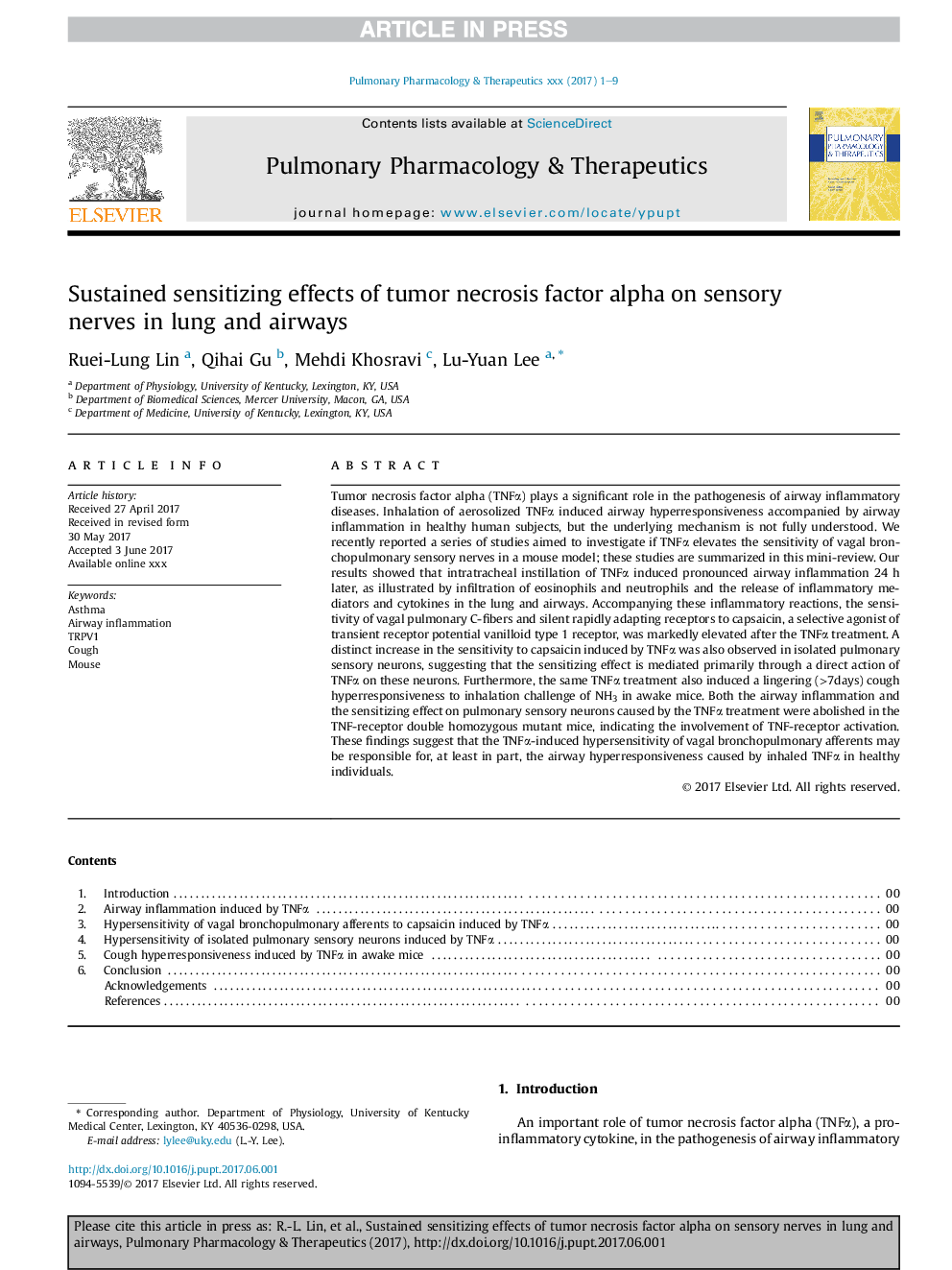| کد مقاله | کد نشریه | سال انتشار | مقاله انگلیسی | نسخه تمام متن |
|---|---|---|---|---|
| 8537889 | 1561076 | 2017 | 9 صفحه PDF | دانلود رایگان |
عنوان انگلیسی مقاله ISI
Sustained sensitizing effects of tumor necrosis factor alpha on sensory nerves in lung and airways
ترجمه فارسی عنوان
اثرات حساس پذیری پایدار عامل آکرومغناطیس تومور بر عصب حسی در ریه و راه هوایی
دانلود مقاله + سفارش ترجمه
دانلود مقاله ISI انگلیسی
رایگان برای ایرانیان
موضوعات مرتبط
علوم پزشکی و سلامت
پزشکی و دندانپزشکی
پزشکی ریوی و تنفسی
چکیده انگلیسی
Tumor necrosis factor alpha (TNFα) plays a significant role in the pathogenesis of airway inflammatory diseases. Inhalation of aerosolized TNFα induced airway hyperresponsiveness accompanied by airway inflammation in healthy human subjects, but the underlying mechanism is not fully understood. We recently reported a series of studies aimed to investigate if TNFα elevates the sensitivity of vagal bronchopulmonary sensory nerves in a mouse model; these studies are summarized in this mini-review. Our results showed that intratracheal instillation of TNFα induced pronounced airway inflammation 24 h later, as illustrated by infiltration of eosinophils and neutrophils and the release of inflammatory mediators and cytokines in the lung and airways. Accompanying these inflammatory reactions, the sensitivity of vagal pulmonary C-fibers and silent rapidly adapting receptors to capsaicin, a selective agonist of transient receptor potential vanilloid type 1 receptor, was markedly elevated after the TNFα treatment. A distinct increase in the sensitivity to capsaicin induced by TNFα was also observed in isolated pulmonary sensory neurons, suggesting that the sensitizing effect is mediated primarily through a direct action of TNFα on these neurons. Furthermore, the same TNFα treatment also induced a lingering (>7days) cough hyperresponsiveness to inhalation challenge of NH3 in awake mice. Both the airway inflammation and the sensitizing effect on pulmonary sensory neurons caused by the TNFα treatment were abolished in the TNF-receptor double homozygous mutant mice, indicating the involvement of TNF-receptor activation. These findings suggest that the TNFα-induced hypersensitivity of vagal bronchopulmonary afferents may be responsible for, at least in part, the airway hyperresponsiveness caused by inhaled TNFα in healthy individuals.
ناشر
Database: Elsevier - ScienceDirect (ساینس دایرکت)
Journal: Pulmonary Pharmacology & Therapeutics - Volume 47, December 2017, Pages 29-37
Journal: Pulmonary Pharmacology & Therapeutics - Volume 47, December 2017, Pages 29-37
نویسندگان
Ruei-Lung Lin, Qihai Gu, Mehdi Khosravi, Lu-Yuan Lee,
